The One Type of Walking You’re Not Doing Enough Of, Says Science
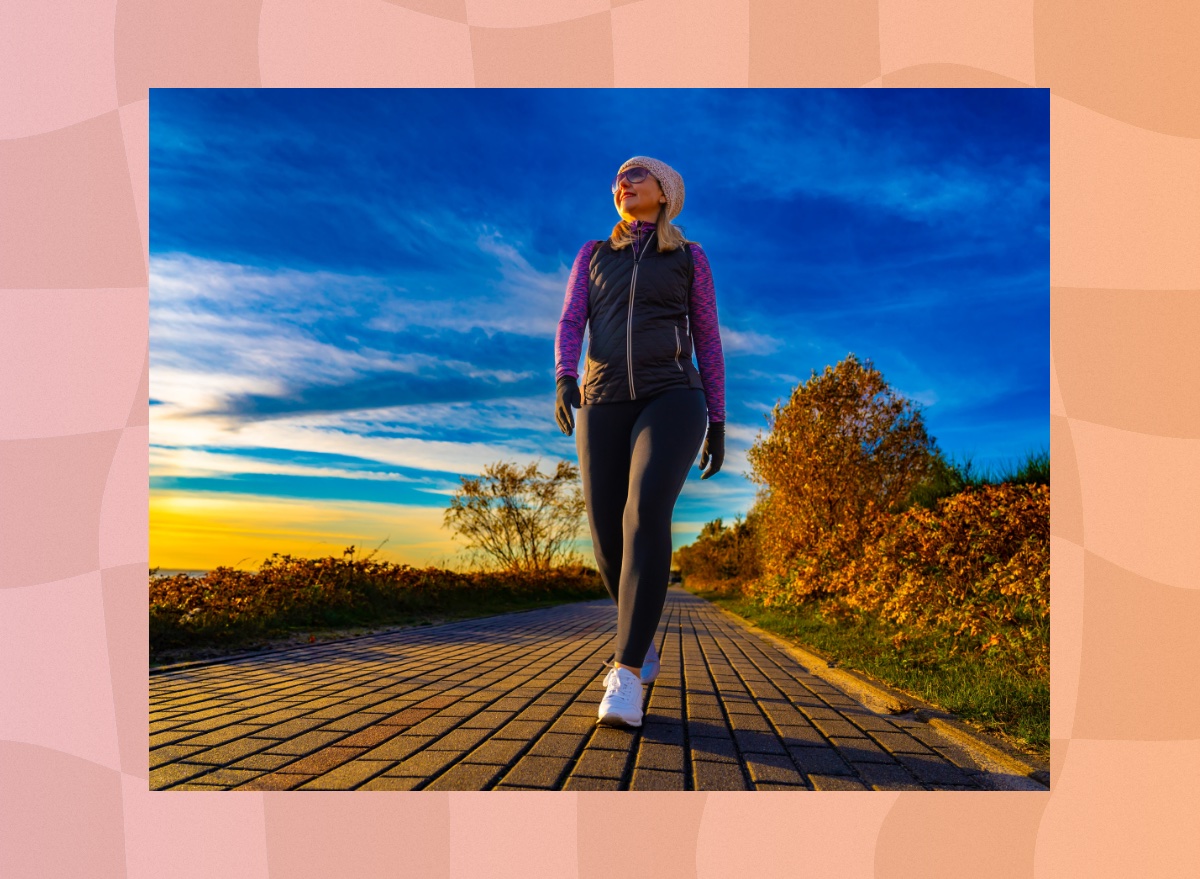
Brisk walking is a form of exercise that leading scientists say can add up to 20 years to your life. As tons of research has shown, hitting the pavement daily for brisk ways can boost your brain, work your muscles, protect your heart, and elevate your sense of wellbeing. If you’re really challenging yourself, you can even walk your way to a flatter stomach. (Oh, and if you take your walks at first light? You’ll find yourself sleeping so much better.)
But—believe it or not—walking isn’t even the best form of walking you can be doing. Scores of studies show that hiking—or trekking off-road—can provide you with all of those benefits and even a few more. And while walking has been steadily on the rise for the last few years, until COVID-19 came along, hiking was actually on a steady decline in popularity.
If you’re a daily walker and you’d like to get the absolute most of your time on two feet, read on, because here are a few of the enhanced side effects of taking your walks into the hilly woods, uneven trails, and other harder-to-navigate terrains near you. Just remember to buy some great rugged trail shoes before you go! And for more on the proper footwear while walking, don’t miss The Secret Cult Walking Shoe That Walkers Everywhere Are Totally Obsessed With.
It’s Incredible Cardio Exercise
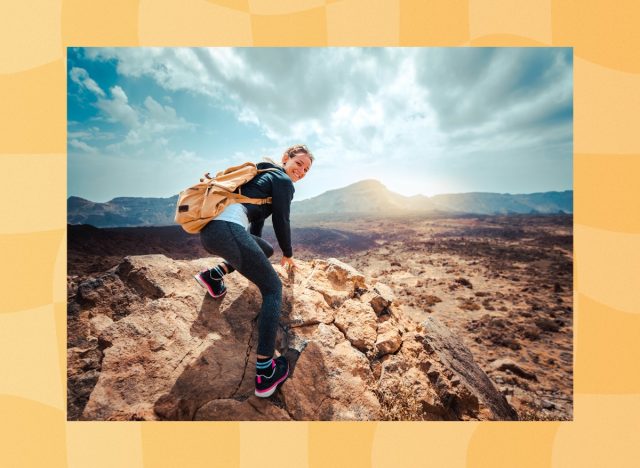
According to a study published in the American Journal of Preventative Medicine, Nordic walking—a form of hiking in which you propel yourself along with handheld poles—is amazing at lowering your resting heart rate, your blood pressure, your “exercise capacity,” your oxygen consumption, and your “quality of life.” What’s more, the study found that those who Nordic walked with no preexisting conditions—and those who suffered from chronic illnesses like Parkinson’s disease—lost weight and gained muscle strength. And for more great walking tips, check out these Secret Little Tricks for Walking More Every Day, According to Experts.
It’s Better for Balance Than Regular Walking
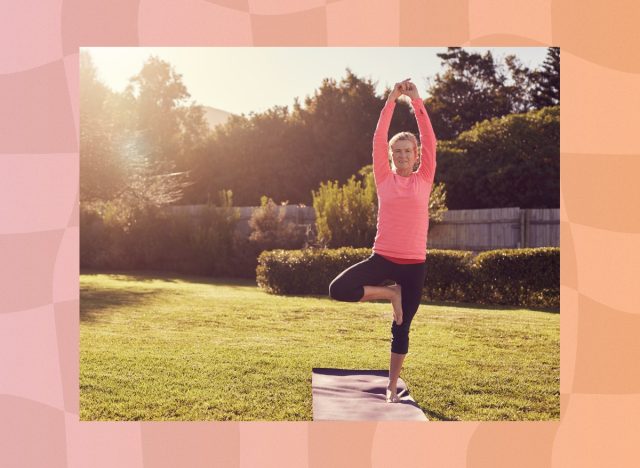
One study published in the Journal of Exercise Rehabilitation focused specifically on hiking among obese women, who participated in a “trekking program” in which they went for moderate-intensity, 90-minute hikes on three days per week for three months. At the end of the study, yes, the participants lost weight, gained muscle, and had better blood pressure. But they also showed better balance and flexibility.
Believe it or not, the fitness game changer of hiking isn’t necessarily the ascent up a trail—which is the hardcore equivalent of hitting your stairmaster or doing tons of squats—it’s actually the descent back down that really works your legs and stabilizer muscles.
“To go downhill, your glutes and quads need to do a lot of slow, controlled work to stabilize your knees and hips so you don’t fall,” Joel Martin, Ph.D., a professor of exercise, fitness, and health promotion at George Mason University, explained to Shape. “These types of contractions damage muscle fibers the most because you’re resisting the force of gravity against weight, which in this case is the weight of your body.” And if you love walking, make sure you know The Secret to Walking Your Way to a Lean Body, Say Experts.
It’s Better for Your Mind—And Your Relationships—Than Just Walking
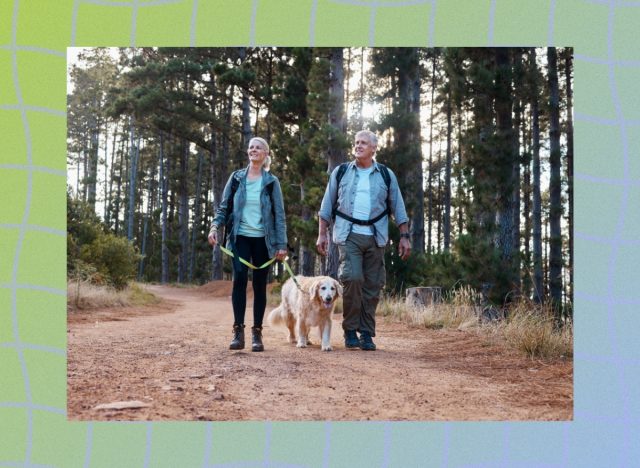
According to a report published earlier in the year by The Wall Street Journal, walking in nature, specifically, comes with a range of added benefits for your mind that you won’t necessarily get when you’re on a treadmill or walking down your neighborhood sidewalk.
“Spending time in the woods—a practice the Japanese call ‘forest bathing‘—is strongly linked to lower blood pressure, heart rate and stress hormones and decreased anxiety, depression and fatigue,” observed the WSJ.
As Jill Suttie, Psy.D., explained in an article published by the University of California, Berkeley, there’s a raft of scientific research that shows why hiking is one of the best exercises you can do for your mind. “Evidence suggests that being around trees may provide extra benefits, perhaps because of certain organic compounds that trees exude that boost our mood and our overall psychological well-being,” she writes.
She also notes that “hiking exercises the part of your brain designed to help you navigate through life—for example, the restrosplenial cortex and the hippocampus, which aids in memory, too—which is why hiking not only helps your heart, but helps your mind stay sharp, as well.”
What’s more, she also notes that hiking helps us connect with other people. “One reason many of us hike with other people [is that] exercising together can produce special feelings of closeness—and a sense of safety,” she writes. “In one study, mothers and daughters who spent 20 minutes walking in an arboretum (versus a shopping mall) not only showed better attention during a cognitive task, but also had improved interactions with each other, according to independent raters.”
It’s Better for Your Core Than Just Walking

When you’re hiking across difficult terrain—lifting yourself over rocks, bending sideways to navigate a switchback trail, supporting yourself with tree branches as you move along—you’ll be constantly engaging your core muscles such as your abs, your obliques, and your back muscles as you constantly work to keep your body upright and stable. And for one amazing tip for getting even more out of your walks, don’t miss The Secret to Walking for Exercise, Says Harvard.
Here’s One Great Way to Get Started
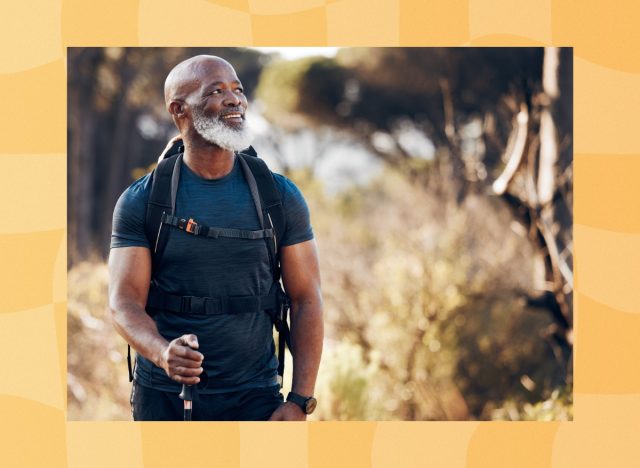
“Even if you’ve never hiked before, it’s easy to get started,” says Lindsay Bottoms, a grad student in Exercise and Health Physiology, University of Hertfordshire. She notes that there are tons of apps that provide nearby trails so that you can find the nearest routes.
“You can also try the 1,000-mile challenge if you want to start hiking,” she writes. “This encourages people to walk 1,000 miles in a year. This has helped many people—including my own parents— to be more active, especially during COVID-19.” And if you’d like to sweat a little bit more while walking, see Why This Amazing Walking Workout Is Going Viral.








